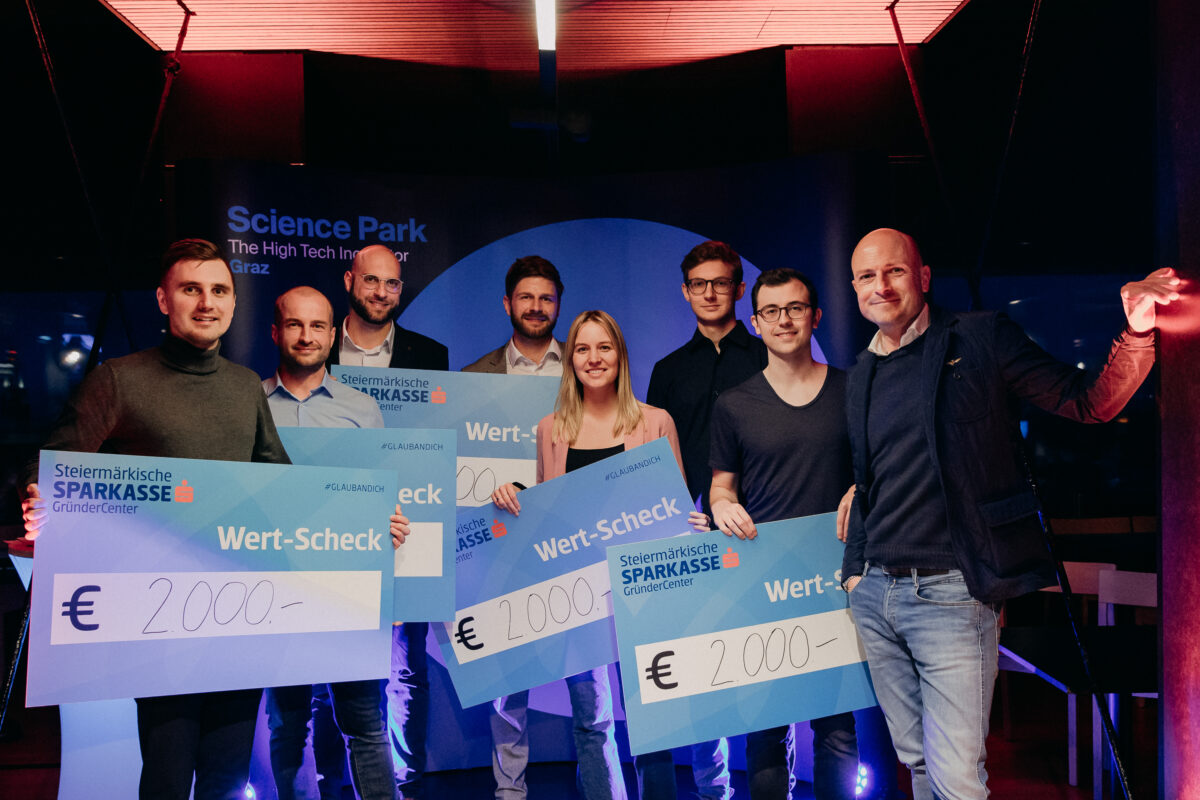- 19 — 04 — 2023
- Science Park Graz
Your ideas matter!
This year's Start-up Idea Competition clearly showcased that green business ideas are on the rise. High-performance photovoltaic modules with innovative light guidance, AI software for developing e-drives and a platform for sustainable investments: In the fight against climate change, the winners of the already 17th edition of the "Start-up Idea Competition" of Science Park Graz served up green solutions.
On April 13, 2023, the final pitches and the award ceremony took place at SPG. It was a day full of inspiring young innovators presenting their innovative projects in front of a top-class jury. Followed by a great evening and 6 proud winners.
This year we received around 220 international applications. Almost two-thirds of them dealing with the topics of ecology and sustainability.
At this point we want to thank our top-class jury for their valuable contribution over several years. Without them, the event would not be the same! As every year, they obviously enjoyed selecting the 6 winners out of 18 amazing presentations. We would also like to thank everyone involved for believing in themselves and their ideas! Only those who really want to make a difference take the next step!
Key facts:
- around 220 international applications
- 18 finalists
- 7 jury members
- 6 categories
- 12,000 EUR prize money
And the winners are:
Mobility
Project: OPED
Presented by: Martin Hofstetter & Dominik Lechleitner
Make better products within shortest time and solid confidence – that’s what the software OPED achieves by revolutionizing product development with AI methods. The result you get are detailed product designs with best possible energy efficiency, life-cycle cost, ecological footprint and any other goal you might have. Building on their strong automotive powertrain expertise, their vision is to further expand to other products and other industry sectors.
Energy & Environment
Project: SunPur
Presented by: Leonard Stacher & Tobias Kulmburg
The most efficient solar cells on the market, so-called multi-junction cells, have to track the position of the sun for cost reasons, which severely limits their area of application, since the entire panel has to move. An installation on house roofs or balconies, for example, is therefore very difficult and hardly possible. SunPur solves this limitation with a fully integrated, internal sun tracker, which means that the more efficient module no longer has to move and can be as easily installed like conventional PV modules, while increasing the energy yield.
Health
Project: Maternia
Presented by: Clara Maspons
Maternia is a low-tech, low-cost, intuitive and portable medical device that allows pregnant women with limited access to quality prenatal care to monitor their fetus’ wellbeing without medical assistance.
Special Societal Impact
Project: money:care
Presented by: Katharina Herzog
money:care is a platform for private investors to match sustainable investments with their individual values. It aims to guide impact-driven retail investors throughout their entire investment journey by offering a range of services including financial education, a searchable database of sustainable investments, and tools to monitor the impact and financial performance of their investments. To accomplish this, money:care uses an AI-based data collection tool to gather sustainability data and process it into an easy-to-understand and transparent sustainability model.
Digital Economy & ICT
Project: OG Sense
Presented by: Valters Slava
The OG Sense team has developed a new technology for ammonia gas measurements. OG Sense is the first sensor in the market that does not degrade in reaction with ammonia and can last for years instead of months.
Space
Project: N Vision
Presented by: Gerhard Neuhold
The goal of N Vision is to provide state-of-the-art and high-quality AI-based computer vision solutions to automatically extract geospatial data from satellite and aerial imagery. The automatic extraction of data on a large scale enables new use cases and makes existing ones more efficient. Example applications include map building and map updating, windthrow detection, solar and photovoltaic panel monitoring or land cover classification.
Congrats to all winners and thank you to all finalists and applicants! You are great!
Looking forward to next year's Start-up Idea Competition!
